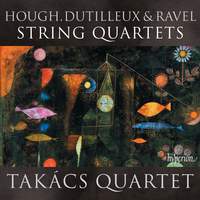Recording of the Week,
The Takács Quartet perform string quartets by Ravel, Dutilleux, and Stephen Hough
A new recording from the Takács Quartet is always something to look forward to, and their latest, French-themed album is no exception. There are many fine recordings of Ravel's String Quartet already, but even with so many choices on offer I feel that they still have something interesting to say - it's a vibrant reading that is full of determined propulsion in the second movement (not least the authoritative thwack of their closing pizzicatos!), followed by a poignant, searching account of the third movement. Perhaps performances by some other ensembles are a touch more hard-driven and earthy in the final movement, whereas the Takács players seem to take a more refined, elegant approach, but that's by no means a bad thing and it certainly adds up to an immensely satisfying reading of the piece.
 If I appear to be rushing past Ravel's work without sufficient regard, then it is only because I am keen to extol the virtues of its companion pieces, not least a magnificent account of another great twentieth-century French string quartet, namely Henri Dutilleux's Ainsi la nuit. Written between 1973 and 1976, Dutilleux himself described the work as a group of short studies, each dealing with a particular kind of string sound, and indeed as a vehicle for showing off every facet of the Takács players' technique it couldn't be more ideal. Every nuance and technical demand is tossed off with aplomb and seeming ease, and yet none of it ever comes across as virtuosity for its own sake; they illuminate and elucidate the musical sense and meaning behind every moment.
If I appear to be rushing past Ravel's work without sufficient regard, then it is only because I am keen to extol the virtues of its companion pieces, not least a magnificent account of another great twentieth-century French string quartet, namely Henri Dutilleux's Ainsi la nuit. Written between 1973 and 1976, Dutilleux himself described the work as a group of short studies, each dealing with a particular kind of string sound, and indeed as a vehicle for showing off every facet of the Takács players' technique it couldn't be more ideal. Every nuance and technical demand is tossed off with aplomb and seeming ease, and yet none of it ever comes across as virtuosity for its own sake; they illuminate and elucidate the musical sense and meaning behind every moment.
There are many spellbinding passages where the players barely bring their volume above a mere whisper, such hushed utterances standing in contrast to some ferocious pizzicato passages. Similarly, the final movement, 'Temps suspendu', more than lives up to its name here, with expectant pauses and ravishingly quiet playing making time stand still.
Known primarily as a concert pianist, Stephen Hough is also a prolific composer, mostly (as one might expect) of piano music, but the third work on this album is his String Quartet No. 1. At first glance it might look like a somewhat odd decision to position it against two very French pieces, but it all makes sense once you know that it was actually commissioned by the Takács Quartet themselves in 2021, with the explicit purpose of being programmed and recorded alongside the other two quartets. Hough's intentions are revealed by the work's subtitle, 'Les Six rencontres', a nod not only to its six movements (each with a French title), but also to the influential group of composers known as 'Les Six' (comprising Poulenc, Honegger, Milhaud, Auric, Durey, and Tailleferre).
Clearly, Hough has succeeded in his aims: when I initially listened to the piece without being aware of the French connection, my first thought was that it sounded like a lost work by Poulenc. From the breezy insouciance of 'Au boulevard' to the understated melancholy of 'Au parc', it's a delightful piece, and it sounds like the quartet is having a ball performing it, particularly the jaunty interplay in 'À l'hôtel' and the way that in 'Au théâtre' they bring out the humour of the overly-dramatic musical gestures, not least the deliberately exaggerated vibrato and glissandos imitating a slightly dodgy opera singer somewhat past their prime...
It's not all whimsy and frivolity, however: the fifth movement, 'À l'église', offers a temporary but welcome respite to the hurly-burly, with some tranquil moments and even the occasional touch of wistful reflection. The calm is short-lived, however, for the final movement takes us 'Au Marché', plunging us into the hustle and bustle of a busy market but without ever losing its sense of playfulness. It's a lovely work, full of wit and panache, that could hardly have more committed, persuasive advocates than the Takács Quartet.
Takács Quartet
Available Formats: CD, MP3, FLAC, Hi-Res FLAC



